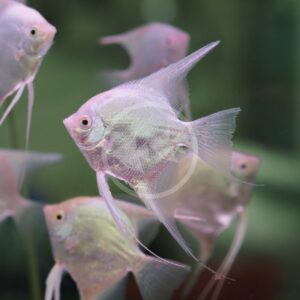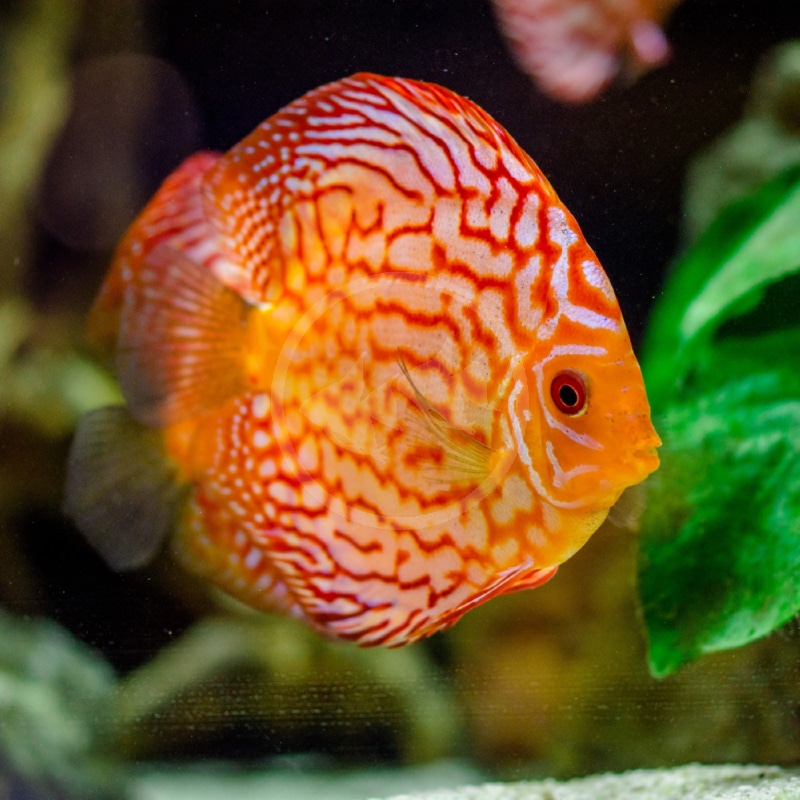DISCUS – PIGEON BLOOD
Symphysodon sp.
$69.99
Discus may be one of the most popular and admired fish within the freshwater aquarium trade. Nothing quite compares to this incredibly beautiful South American cichlid! Originating from the Amazon River basin, Discus can be found in slow moving tributaries and forest pools that are heavily sheltered in tree roots, rock and vegetation. While caring for Discus has come a long way since their introduction in the 1930s, including that the majority of individuals within the aquarium trade are now produced on a commercial fishery basis (i.e., aquaculture or tank-raised) making them somewhat hardier than wild-caught specimens, Discus do still require exceptional dedication and attention from the hobbyist in order to thrive long term. Things that cannot be overlooked with this species include proper diet, water quality and water parameters (see ‘Care Requirements’ below). As their name suggests, Discus have a ‘disc-like’ body shape, and adults can reach a mature size of at least 6″ wide as they are tall. Discus come in an array of colors and patterns; this listing is for the Pigeon Blood Discus, which have a cream body with a reddish maze pattern and hues of turquoise across the body and fins. Pigeon blood discus also tend to have some “peppery” black spots on their bodies that help to further distinguish them from the similarly patterned Checkerboard Discus. Discus are very social, and at the very least should be kept in pairs but more individuals are encouraged. Some squabbling may be observed between individuals as they sort out their pecking order. A solitary Discus is often one that is very withdrawn and skittish. Note: Offering aquacultured Discus is our first choice here at Aquatics Unlimited!
Care Level: Advanced
Temperament: Peaceful
Live Plant Safe: Yes
General Description: Discus may be one of the most popular and admired fish within the freshwater aquarium trade. Nothing quite compares to this incredibly beautiful South American cichlid! Originating from the Amazon River basin, Discus can be found in slow moving tributaries and forest pools that are heavily sheltered in tree roots, rock and vegetation. While caring for Discus has come a long way since their introduction in the 1930s, including that the majority of individuals within the aquarium trade are now produced on a commerical fishery basis (i.e., aquaculture or tank-raised) making them somewhat hardier than wild-caught specimens, Discus do still require exceptional dedication and attention from the hobbyist in order to thrive long term. Things that cannot be overlooked with this species include proper diet, water quality and water parameters (see ‘Care Requirements’ below). As their name suggests, Discus have a ‘disc-like’ body shape, and adults can reach a mature size of at least 6″ wide as they are tall. Discus come in an array of colors and patterns; this listing is for the Pigeon Blood Discus, which have a cream body with a reddish orange maze pattern and hues of turquoise across the body and fins. Pigeon blood discus also tend to have some “peppery” black spots on their bodies that help to further distinguish them from the similarly patterned Checkerboard Discus. Discus are very social, and at the very least should be kept in pairs but more individuals are encouraged. Some squabbling may be observed between individuals as they sort out their pecking order. A solitary Discus is often one that is very withdrawn and skittish. Note: Offering aquacultured Discus is our first choice here at Aquatics Unlimited!
Diet Requirements: Discus are omnivores, but a greater portion of the diet should focus on feeding high quality protein items. Discus should never be fed live fish, beef heart or any other sort of mammalian meat as this can disrupt their digestive system. A diet made up of various high quality spirulina algae based and crustacean/invertebrate protein based frozen foods are ideal. These include, but are not limited to, bloodworms, daphnia, shrimps, krill, chopped clam, brine shrimp, and certain freshwater mixes. Variety is the spice of life in order to maintain color, immune function and longevity of your fish. Flake and pellet foods that are not nutritionally dense should be avoided. Certain freeze-dried foods are a better alternative, and live blackworms are a fun occasional treat.
Care Requirements: A minimum 30 gallon aquarium is ideal for a pair of small Discus; adults or a group will require more space, particularly as they mature. This aquarium size, or larger, also provides a more stable environment needed for these delicate cichlids. Discus should not be introduced into a biologically immature aquarium. They are extremely intolerable of nitrite or ammonia, and will not endure deteriorating water parameters. Weekly water changes are needed to keep water parameters pristine (Nitrates < 10 ppm). Equipping the aquarium with a canister filter can also be advantageous to maintain a healthier and well oxygenated environment for Discus. Discus and live planted aquariums seem to go hand in hand in the hobby, as this type of aquascape is beneficial to make Discus feel more comfortable. If live plants are not a goal of your aquarium, the tank would need to be aquascaped generously with other cover (e.g., driftwood, fake plants, rocks) in order to provide the cover needed for this shy species. In the proper environment, Discus can become very bold and personable with their caretakers. Discus are not powerful swimmers and therefore prefer gentle water flow, in addition to softer water, warmer water, and a more acidic pH. Discus by nature are peaceful and will rarely conflict with tank mates. This timid nature, in addition to their large body size, however makes them not suitable for community aquariums that have overly rambunctious, competitive or somewhat aggressive species. Most hobbyists tend to keep Discus as a “species only” tank, but these fish have been successfully kept with docile South American shoaling tetra such as Cardinal tetra (Paracheirodon axelrodi), Neon tetra (Paracheirodon innesi), Rummynose tetra (Hemigrammus rhodostomus) and Bloodfin tetra (Aphyocharax anisitsi) for example. Extra care should be taken acclimating Discus; we advise using a drip acclimation method. Recommended water conditions, 82-84° F, KH 1-4, pH 5.0-7.0.
Purchase Size: Medium: 2” to 2-1/2”
Note: Your item may not look identical to the image provided due to variation within species. Purchase sizes are approximate.
Dry goods orders are shipped via US Postal Service or UPS to the address provided at checkout based on the selection made in your website shopping cart. Product is carefully packed to help prevent any damage during shipping. Once processed you will receive a shipment notification via email with tracking number, and delivery notification. Please allow 48 hours for processing after your order is placed.
Perishable items (i.e. live plants, refrigerated/frozen foods) are shipped via US Postal Service 2-3 day to the address provided at checkout for a $25.00 flat rate charge. Items are packed with secure packing material and heat, cold, or Cryo packs as needed to maintain safe temperatures during transit. If one or more perishable items are in the shopping cart at checkout the $25.00 perishable shipping charge will automatically appear and need to be selected. Once processed you will receive a shipment notification via email with tracking number. Please allow 48 hours for processing after your order is placed.
Livestock (i.e. fish, invertebrates, coral) are shipped via UPS Overnight to the address provided at checkout for a $55.00 flat rate charge. Livestock is packed in insulated styrofoam boxes with secure packing material and heat, cold, or Cryo packs as needed to maintain safe temperatures during transit. If one or more livestock items are in the shopping cart at checkout the $55.00 livestock shipping charge will automatically appear and need to be selected. Livestock is shipped Monday through Wednesday ONLY (no weekend delivery is available) weather permitting, and we reserve the right to delay shipping until conditions are appropriate for safe arrival. Once your order is placed we will contact you to arrange the best shipping date based on these criteria. Someone must be available to receive the livestock order on the first delivery attempt. Once processed you will receive a shipment notification via email with tracking number. Please allow 48 hours for processing after your order is placed.
For mixed dry goods/perishable & livestock orders items will be shipped via their corresponding shipping methods outlined above. Dry goods will be shipped via US Postal Service or UPS based on your selection and checkout, while livestock will ship via UPS Overnight for a $55.00 flat rate charge. You will receive separate notifications and tracking numbers for the dry goods and livestock. Please note due to different carriers and shipping methods dry goods and livestock may arrive on different days.
Related products
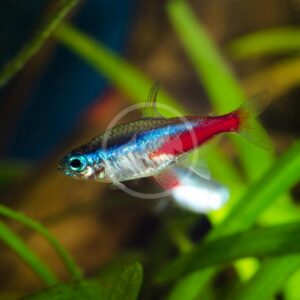
TETRA – NEON
Paracheirodon innesi
$6.99
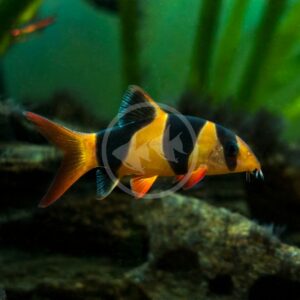
LOACH – CLOWN
Chromobotia macracanthus
$16.99 – $199.99Price range: $16.99 through $199.99
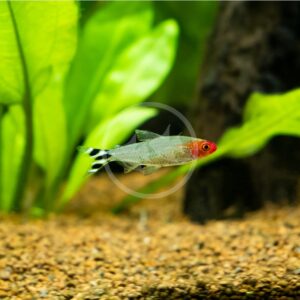
TETRA – RUMMYNOSE
Hemigrammus rhodostomuss
$9.99
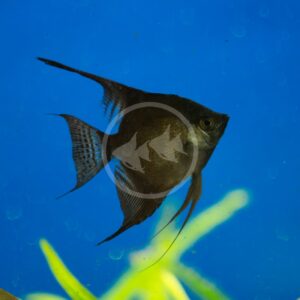
ANGELFISH – FW BLACK
Pterophyllum scalare
$6.99 – $49.99Price range: $6.99 through $49.99
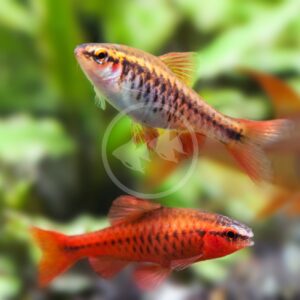
BARB – CHERRY
Puntius titteya
$3.99 – $9.99Price range: $3.99 through $9.99
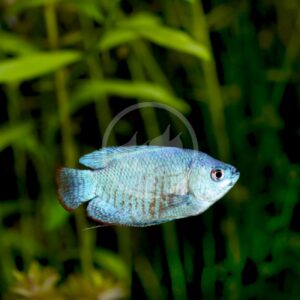
GOURAMI – DWARF POWDER BLUE
Trichogaster lalius
$11.99 – $14.99Price range: $11.99 through $14.99
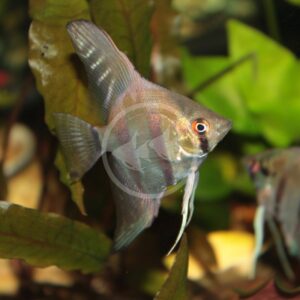
ANGELFISH – FW SILVER
Pterophyllum scalare
$9.99 – $39.99Price range: $9.99 through $39.99
